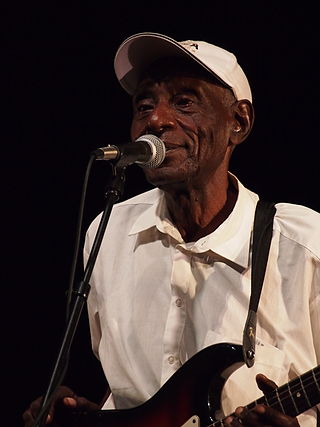Related Research Articles
Simba Wanyika was a Kenyan-based band created in 1971 by Tanzanian brothers Wilson Kinyonga and George Kinyonga, and disbanded in 1994. Simba Wanyika and its two offshoots, Les Wanyika and Super Wanyika Stars, became some of the most popular bands in Kenya. Their guitar-driven sound, inspired by the Soukous guitarist Dr. Nico, combined highly melodic rumba with lyrics sung in Swahili. Simba wa nyika means "Lions of the Savannah" in Swahili.

The music of Kenya is very diverse, with multiple types of folk music based on the variety over 50 regional languages.

John Bush Shinn III was an American country music singer, songwriter, and musician. Nicknamed the "Country Caruso", Bush was best known for his distinctive voice and for writing the song "Whiskey River", a top 10 hit for himself which also became the signature song of fellow country artist Willie Nelson. He was especially popular in his native Texas.

Benga is a genre of Kenyan popular music. It evolved between the late 1940s and late 1960s, in Kenya's capital city of Nairobi. In the 1940s, the African Broadcasting Service in Nairobi aired a steady stream of soukous, South African kwela, Congolese finger-style guitar and various kinds of Cuban dance music that heavily influenced emergence of benga. There were also popular folk songs of Tanzania and Kenya's Luo peoples that formed the base on benga creation.
"My Back Pages" is a song written by Bob Dylan and included on his 1964 album Another Side of Bob Dylan. It is stylistically similar to his earlier folk protest songs and features Dylan's voice with an acoustic guitar accompaniment. However, its lyrics—in particular the refrain "Ah, but I was so much older then/I'm younger than that now"—have been interpreted as a rejection of Dylan's earlier personal and political idealism, illustrating his growing disillusionment with the 1960s folk protest movement with which he was associated, and his desire to move in a new direction. Although Dylan wrote the song in 1964, he did not perform it live until 1988. However, during his 1978 tour, his band played a brief instrumental version of it as Dylan took the stage.
Daudi Kabaka (1939–2001) was a Kenyan vocalist and musician.
Samba Mapangala is a Congolese singer and bandleader who has been based in Kenya for most of his five-decade musical career, most notably there creating and leading Virunga, which has been one of the most popular bands in East Africa for more than 35 years.
Daniel Owino Misiani was a Tanzanian-born musician based in Kenya, where he led the Shirati Jazz collective. He was known as the "King of History" in Kenya; overseas and in Tanzania, he was known as "the grandfather of benga", which he pioneered.

George Ramogi (1945–1997) was a Kenyan musician, who empowered the traditional luobenga and rumba genre of music. Ramogi was known for his spur of the good life and his notable appearances at bars and clubs in western Kenya-Nyanza region. During the beginning of his career. Ramogi is believed to have been the real force behind “benga” as a genre.

Them Mushrooms is a musical band from Kenya, playing mostly Chakacha, some Benga and also some reggae. They are most famous for the Swahili 1982 song Jambo Bwana. The band is composed of Teddy Kalanda, Henry Ndenge Saha and Ben Mutwiwa. They mainly do covers of previously written hit songs.
Kevin Omondi Migot better known for his stage name Dola Kabarry is a benga musician from Kenya. He leads the band Orchestra Super Haki Haki. His songs are mainly in Dholuo language.

Nyota Ndogo is a musician from Kenya who performs taarab-influenced pop music.
Joseph Kamaru was a Kenyan Benga and gospel musician and political activist. He was an icon, a hero, and a leading Kikuyu musician, who has sold about half a million records. He was notable for his politically motivated songs either praising or criticising the government. His music covered the teachings of life, promiscuity and sexual harassment in Kenyan politics and social culture.

John Nzenze was a musician from Kenya. He had performed the twist dance style. Some of his most popular songs were "Angelike", "Julieta Rudi Tuone" and "Habari za Nairobi ".
Maroon Commandos is a musical group from Kenya. It is a military band belonging to 7 Kenya Rifles of the Kenya Army. They are based at the Langata Barracks in Langata, Nairobi. The group performs benga, rumba and other styles of music. They perform both original and cover versions. The band plays often at state functions.
Deux Vultures is a musical group in Kenya performing hip hop and pop music.
Princess Jully was a benga musician from Kenya.
Jane Nyambura, better known by her stage name Queen Jane was a Kenyan benga musician performing in Kikuyu language.
Christine Kamau is a Kenyan jazz musician and composer, who plays the trumpet and the saxophone. She has performed at various Kenyan and international music venues and festivals. In 2012, she appeared in the BBC series 'African Beats', featuring emerging African musicians.
References
- 1 2 3 4 "DK: A thousand songs down and still going". The Standard. August 16, 2009.
- ↑ Worlds of the Indian Ocean connecting the past to the future February 19–23, 2009· Nairobi, Kenya: Film: Retracing the Benga Rhythm & Live Concert: D.K.Mwai and Queen Babito Archived 2009-11-06 at the Wayback Machine
- ↑ Michael Drewett & Martin Cloonan: Popular music censorship in Africa. Ashgate Publishing, Ltd., 2006. ISBN 0-7546-5291-2
- ↑ Richard Trillo: Rough guide to Kenya 7th edition, Rough Guides, 2002. 1858288592 ISBN